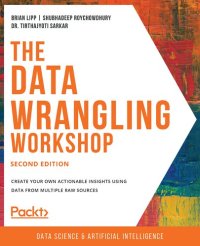
Ebook: The Data Wrangling Workshop: Create your own actionable insights using data from multiple raw sources
- Tags: Computer Technology, Nonfiction, COM018000, COM051360, COM089000
- Year: 2020
- Publisher: Packt Publishing
- Edition: 2
- Language: English
- epub
A beginner's guide to simplifying Extract, Transform, Load (ETL) processes with the help of hands-on tips, tricks, and best practices, in a fun and interactive way
Key FeaturesWhile a huge amount of data is readily available to us, it is not useful in its raw form. For data to be meaningful, it must be curated and refined.
If you're a beginner, then The Data Wrangling Workshop will help to break down the process for you. You'll start with the basics and build your knowledge, progressing from the core aspects behind data wrangling, to using the most popular tools and techniques.
This book starts by showing you how to work with data structures using Python. Through examples and activities, you'll understand why you should stay away from traditional methods of data cleaning used in other languages and take advantage of the specialized pre-built routines in Python. Later, you'll learn how to use the same Python backend to extract and transform data from an array of sources, including the internet, large database vaults, and Excel financial tables. To help you prepare for more challenging scenarios, the book teaches you how to handle missing or incorrect data, and reformat it based on the requirements from your downstream analytics tool.
By the end of this book, you will have developed a solid understanding of how to perform data wrangling with Python, and learned several techniques and best practices to extract, clean, transform, and format your data efficiently, from a diverse array of sources.
What you will learnThe Data Wrangling Workshop is designed for developers, data analysts, and business analysts who are looking to pursue a career as a full-fledged data scientist or analytics expert. Although this book is for beginners who want to start data wrangling, prior working knowledge of the Python programming language is necessary to easily grasp the concepts covered here. It will also help to have a rudimentary knowledge of relational databases and SQL.